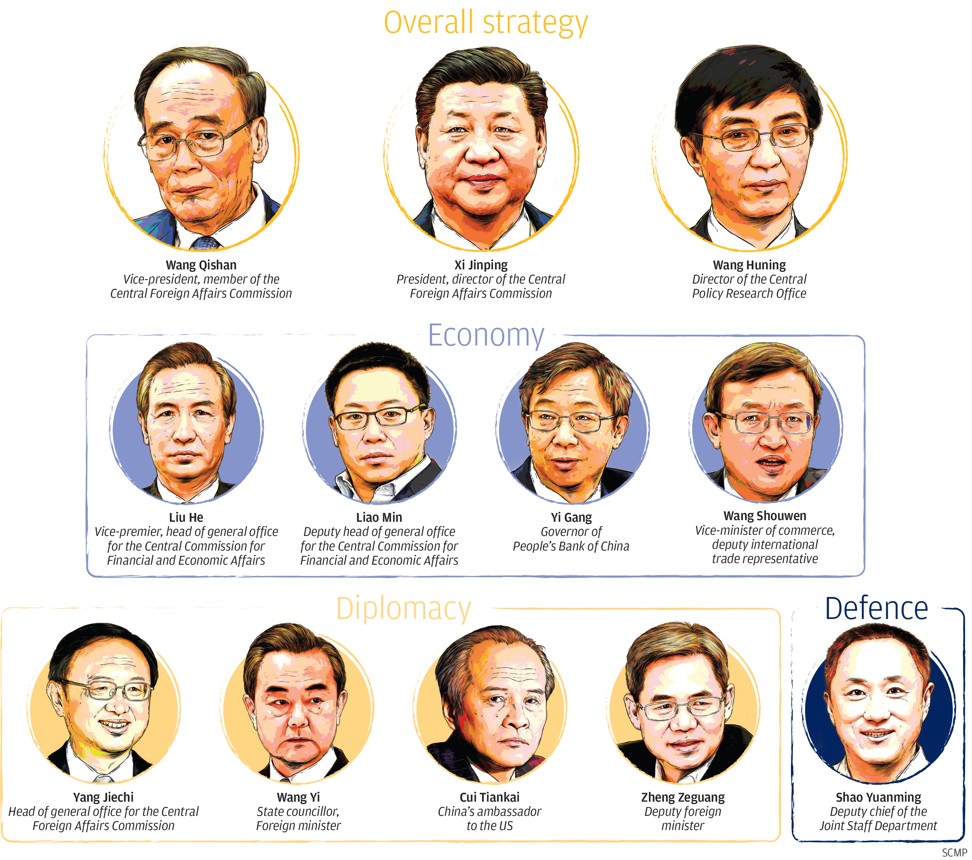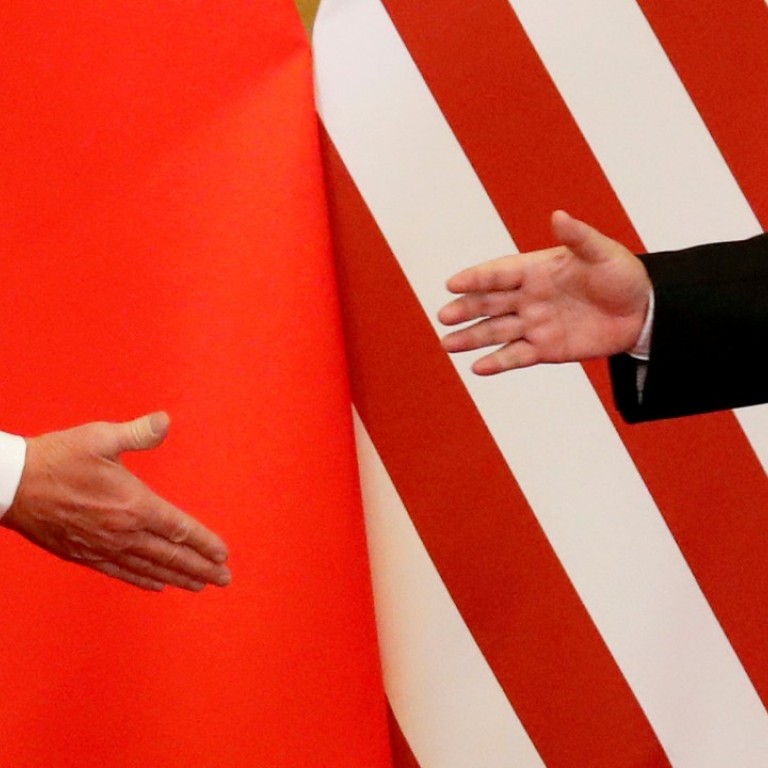
Who’s on China’s new team handling US relations? Meet the most influential negotiators
From trade to diplomacy, economics to defence, a group of trusted officials are helping shape President Xi Jinping’s assertive ‘New Era’
When Chinese Vice-Premier Liu He arrived in Washington for the second round of trade talks with the United States this month, many had their eyes fixed on the Chinese delegation for signs of the key players and new faces who will shape Beijing’s US policy in the coming years.
After the Chinese Communist Party’s leadership changes in October and the reshuffle of state and cabinet leaders in March, President Xi Jinping has assembled a new team of officials charged with handling various aspects of US policy, from overall strategic planning to economics, diplomacy and defence.
Xi, the most powerful Chinese leader in decades, has pledged to return China to the centre of the world stage in the “New Era” – an ambition that has seen Beijing boldly increasing its assertiveness in the region and globally.
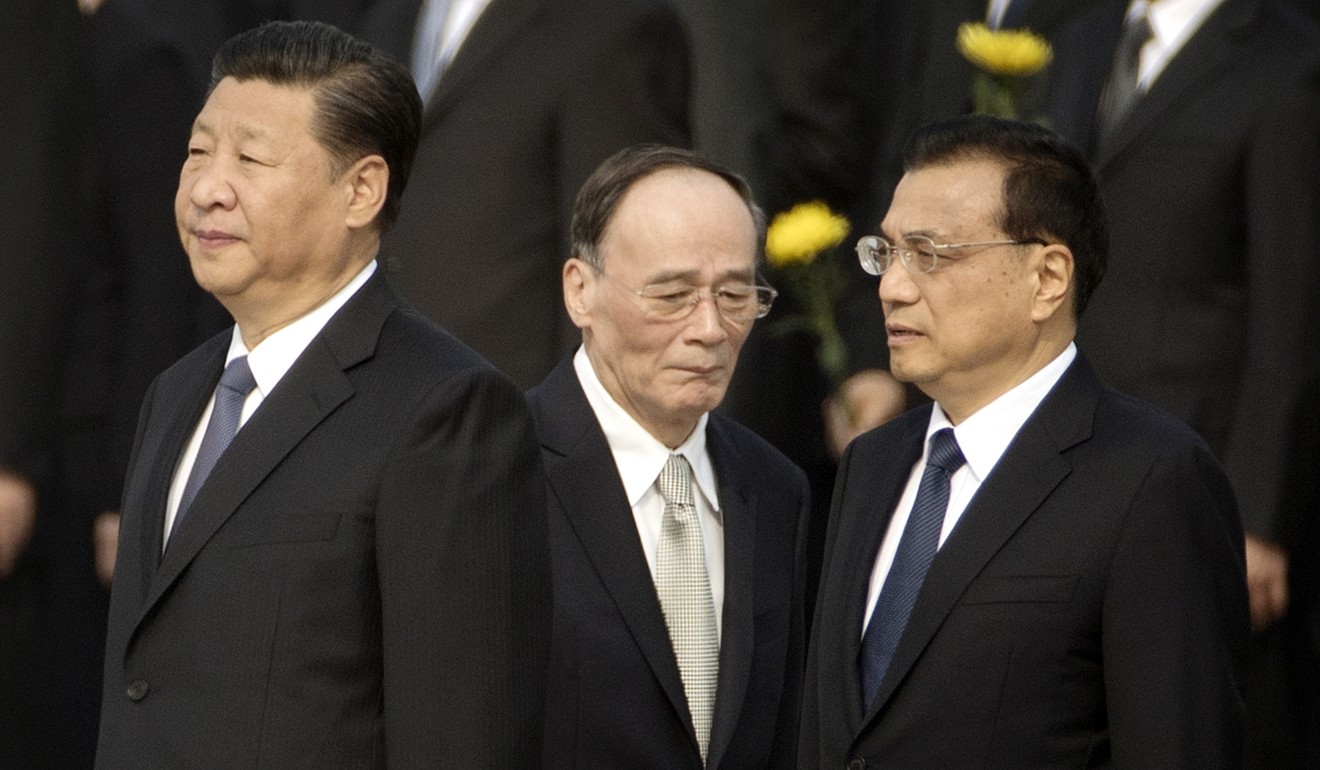
That has unsettled the US, which sees China as a strategic rival for influence in Asia, further straining their ties, already weakened by tensions over trade, transfers of technology and arms sales to Taiwan, which Beijing regards as a breakaway province.
After consolidating immense power in his first term in office, Xi has taken much of China’s foreign policy – as well as domestic policies – into his own hands, with the help of a small circle of trusted allies.
“Ultimately, in today’s era, Chinese diplomacy – in particular towards the US – is largely shaped by Xi Jinping himself,” said Hoo Tiang Boon, a foreign affairs expert at the Rajaratnam School of International Studies at Singapore’s Nanyang Technological University.
“What Xi needs are both capable and trusted people to implement his ideas,” he said.
And for Xi, that most trusted confidant charged with overseeing strategic relations between the world’s largest two economies is Wang Qishan, a long-time troubleshooter for the party with a track record of managing both political and financial crises.
Defying convention, the 69-year-old Wang returned to Xi’s side as vice-president in March and has since been presented as the party’s “No 8” leader, just months after retiring from the party’s supreme Politburo Standing Committee as the much-feared anti-graft tsar.
The pair are not bound by any restrictions on their time in office after the legislature made a controversial move to scrap constitutional term limits for the presidency and vice-presidency, suggesting that their influence on Sino-US ties may last well into the future.
China’s vice-president Wang Qishan given key foreign policy role
The duo’s friendship dates back half a century, when they were sent to work on rural communes away from Beijing during the Cultural Revolution. And Wang’s lasting ties with senior Wall Street figures such as former US treasury secretary Henry Paulson from his years as a banker – along with his experience as China’s point man and top negotiator with the US during the depths of the global financial crisis – have made him the most seasoned “America hand” among the top leadership.
While it was widely believed that Wang would wield considerable influence outside the traditionally ceremonial duties of the vice-presidency, his central role in foreign policy was not revealed until earlier this month, when state media confirmed his membership of the party’s Central Foreign Affairs Commission, a decision-making body headed by Xi himself.
The deputy director of the commission is Li Keqiang, the current premier – a post which has traditionally given its holder a significant role in foreign policy.
However, it remains unclear how much sway Li will have, given his weakened role in policymaking under Xi.
Wang might even return to Washington in late June or July, in an attempt to keep strategic-level dialogue open on various issues, a source familiar with the matter told the South China Morning Post.
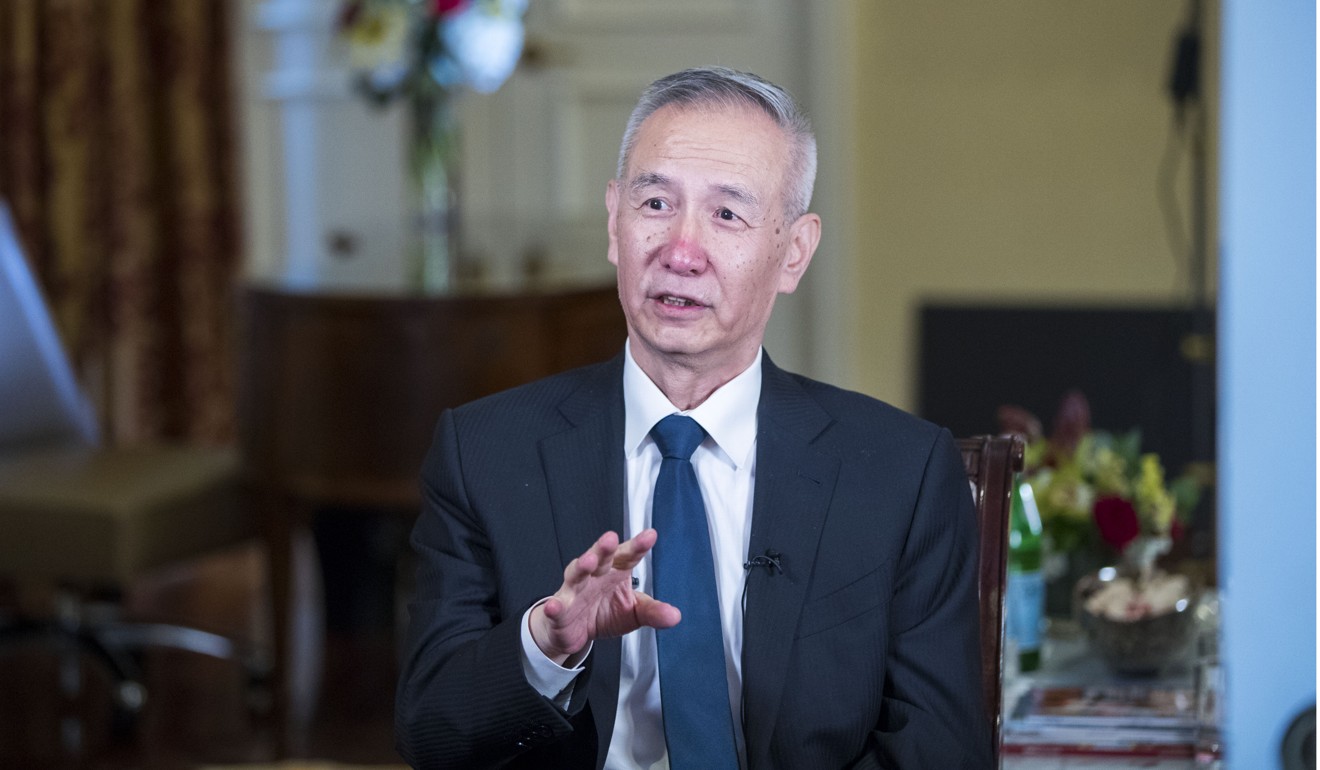
“Wang’s role as the most important aide to Xi on foreign policy was the clearest message from the Central Foreign Affairs Commission’s meeting – there is no more need to guess,” said Chen Qi, an expert on US-China relations at the Carnegie-Tsinghua Centre for Global Policy.
“He is assigned with reconciling the thorniest and most pressing conflicts between China and the US, such as the trade disputes.”
In his first overseas trip after assuming the new foreign policy role, Wang attended the annual St Petersburg International Economic Forum and met Russian President Vladimir Putin last week.
“We must avoid a trade war [with the US] because there won’t be any winners in such a war”, he told the forum on Friday, adding that Beijing had to be ready for any turn of events.
Frequent friction and growing tensions with Washington have provided an opportunity for Beijing to forge closer strategic ties with Moscow to hedge against Donald Trump’s unconventional and aggressive approach towards trade and geopolitics.
Putin will visit China in June to attend the annual summit of the Shanghai Cooperation Organisation in Qingdao.
The bloc, led by Moscow and Beijing, is a regional security group seen by many as a counterweight to the dominant presence of the US and its allies in the region.
Another top adviser to Xi on US policy is Wang Huning, an international affairs scholar turned party theorist who had served three presidents and kept a low profile until being promoted in October to the Politburo Standing Committee, the party’s apex of power.
Wang Huning: the low profile, liberal dream weaver who’s about to become China’s ideology tsar
Credited with being the chief architect of Xi’s “Chinese dream” – a vision for national rejuvenation and global ascendance – Wang, 62, has been Xi’s chief foreign policy adviser and was rarely absent from his foreign travels, including Xi’s three trips to the US since becoming the president.
An ardent advocate for “neo-authoritarianism”, which favours strong central authority and economic and social stability over democracy and individual liberty, Wang did not appear impressed with the US and its democratic system after spending six months there as a visiting scholar in the late 1980s.
In his book America Against America, a reflection on the trip published in 1991, Wang examined what he saw as the many contradictions within American society, and warned that the US political model would not suit China.
With a seat on the Politburo Standing Committee and his portfolio in charge of ideology, propaganda and party organisation, Wang may not be able to join Xi on his foreign trips as before, but he most likely will continue to advise him on foreign – including US – policy from behind the scenes, analysts said.
The growing assertiveness that comes with China’s ascendance is a break from the low-profile approach laid down by then- leader Deng Xiaoping, and the shift manifests itself both in policy and official parlance.
Elizabeth Economy, a senior fellow at the Council on Foreign Relations, a Washington think tank, said that a visit to China earlier this year was the first time that she had heard a senior Chinese scholar or official refer to the country as a “superpower”.
“I think it signals, basically, the belief now in China that they have not only the capability but also the intent to be able to play alongside the United States in terms of shaping the rules of the road,” she told a launch event for her forthcoming book, The Third Revolution: Xi Jinping and the New Chinese State, earlier this month.
With Wang Qishan and Wang Huning forming Xi’s strategic brains trust on the broader scale of China-US relations, the more specific aspects – including economics, diplomacy and defence – are left to other seasoned hands who have won Xi’s trust.
Vice-Premier Liu has been under the spotlight as leader of the Chinese delegation in the two rounds of US trade talks so far. After a first attempt in February failed to break the deadlock, the second round last week got both sides to agree to put the potentially full-out trade war “on hold”, along with threatened tariffs.
Liu, 66, who earned a master’s degree at Harvard’s Kennedy School of Government in 1995, is regarded as the mastermind behind Xi’s supply-side reform efforts to cut overcapacity and improve the economy.
Why Liu He has the most difficult job in the US-China trade talks
Before being promoted to a vice-premier overseeing economic and financial affairs this year, the mild-mannered economist has been wielding most of his influence as the head of the general office of the party’s Central Leading Group for Financial and Economic Affairs, a policymaking body led by Xi. The group was upgraded to a full-fledged commission in March.
He is assisted by Liao Min, 49, the group’s newly appointed deputy director who was added to Liu’s trade delegation to Washington last week.
Having started his career as a trader, Liao is a rising star among China’s economic policymakers for his international finance experience, and plays a key role in drafting policies and tactics in dealing with US trade threats.
From folk singer to international finance expert – Liao Min is a new face on China’s trade team
Another new name in the delegation is Yi Gang, who succeeded Zhou Xiaochuan as head of China’s central bank in March. Yi, 60, has decades of financial experience inside and outside China, including studying and teaching economics at American universities.
Also prominent on Liu’s team is Wang Shouwen, 52, a vice-minister of commerce and Beijing’s deputy international trade representative. Wang arrived in Washington days before Liu to hold discussions with US officials and pave the way for Liu’s second visit.
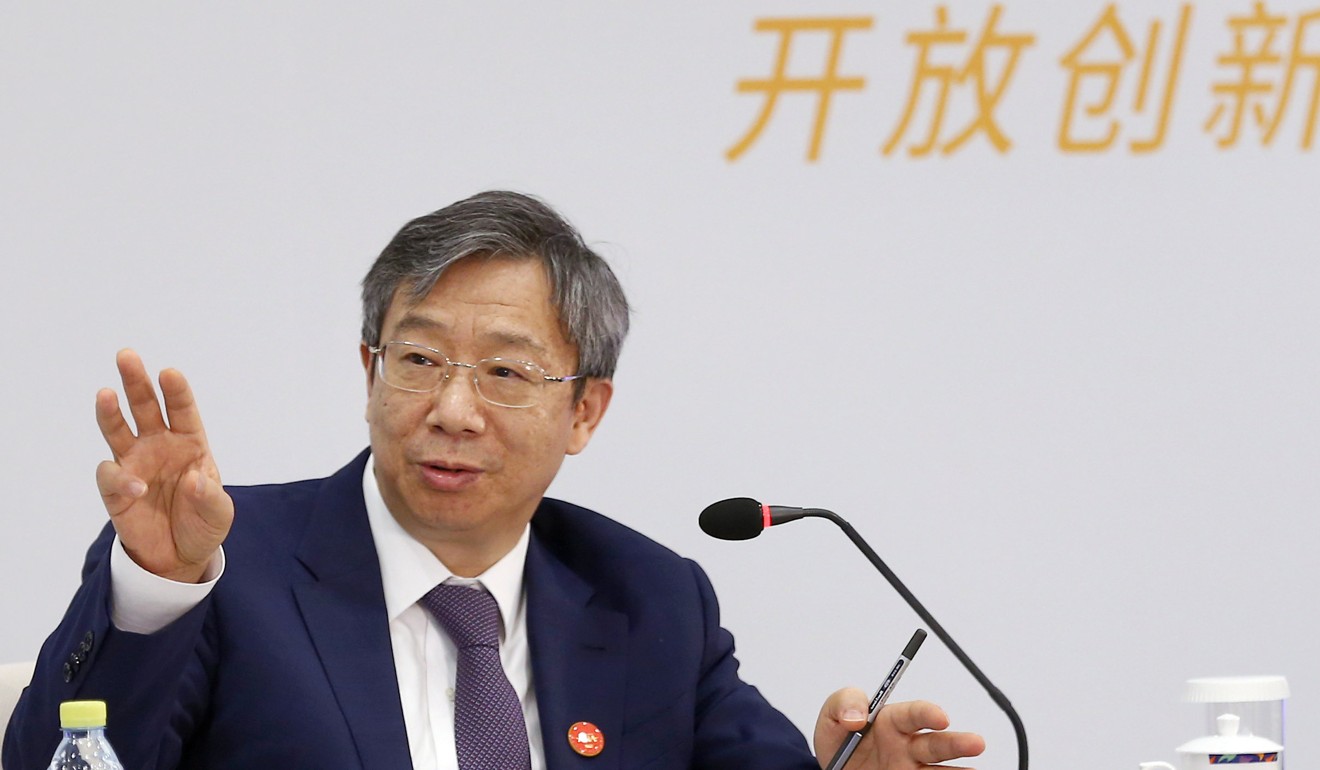
Having spent his entire government career in foreign trade, Wang is one of Beijing’s most well-versed experts in the field.
Officials from the Ministry of Industry and Information Technology, which is in charge of policies such as the “Made in China 2025” initiative to bolster the domestic high-tech sector, and the Ministry of Agriculture were also crucial members in the delegation, with both sectors bearing the brunt of the threatened tariffs and sanctions.
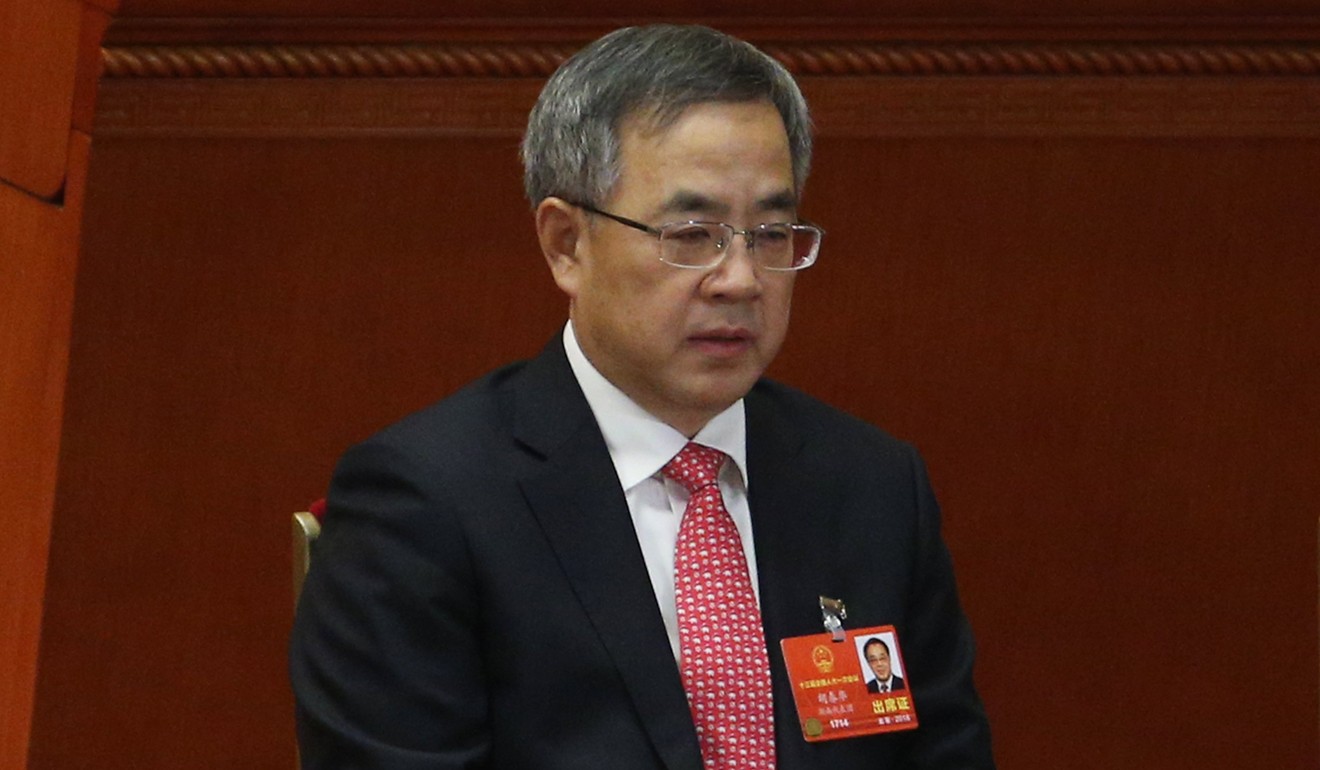
One name that has been missing from public mention is Hu Chunhua, Liu’s fellow vice-premier and at 55 the youngest member on the Politburo, who had been expected to take care of the trade portfolio. Hu’s predecessor, Wang Yang, is a well-known figure among American officials and business leaders, having led previous trade talks with the US.
But since becoming vice-premier, Hu’s name has not appeared in reports about the trade disputes or the efforts to ease them.
On the diplomatic front, Yang Jiechi, who has deep experience in dealing with the US, has become China’s most powerful foreign affairs official in more than a decade since being promoted to the 25-member Politburo last year.
How a trip to Seoul by special envoy Yang Jiechi shows party’s diplomatic ambitions
Yang, 68, is known for his personal ties to the family of former US presidents George H.W. and George W. Bush – with the latter affectionately nicknaming him “Tiger Yang”, after the Year of the Tiger in which he was born.
Yang, a former ambassador to Washington, has played a pivotal role in helping smooth often bumpy Sino-US relations over the past decade, especially during sensitive periods.
When tensions flared in February over continuing differences over trade, the disputed South China Sea and self-ruled Taiwan, Yang was the first to visit Washington to meet with Trump and his White House advisers.
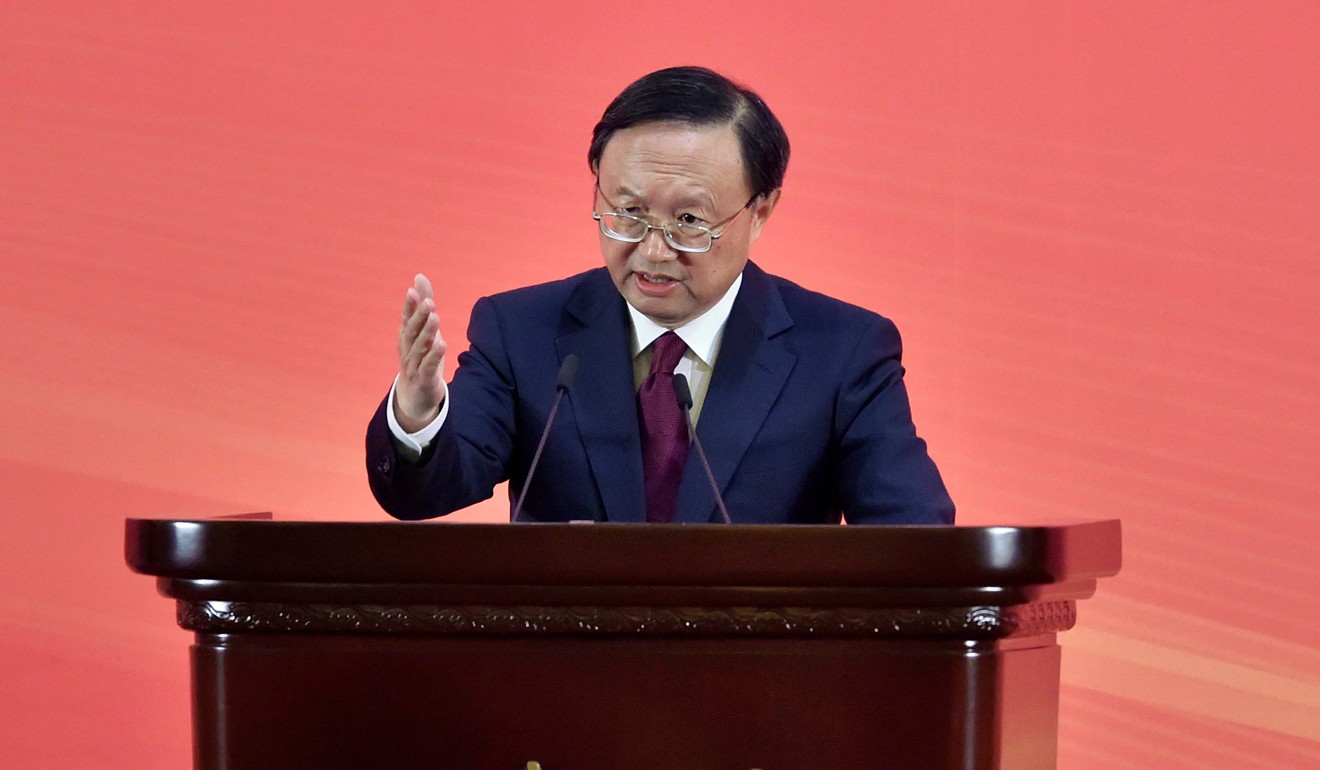
His younger brother Yang Jiemian, 66, a respected strategic affairs scholar and former president of the Shanghai Institutes for International Studies, also has extensive connections to US politicians and business officials.
The two are believed to have coined one of Xi’s favourite catchphrases – the “new type of major power relations” – which he uses to describe the ties between the US and China.
The older Yang has also been credited with helping establish a personal rapport between Xi and Trump and was Beijing’s main conduit for talking to the US administration until the state and cabinet leadership reshuffle in March. Since then, he appears to have taken more of a back-seat role in negotiations.
“As a trained diplomat, Yang would be more hands-on in tackling political and security tensions that fall within the traditional portfolio of diplomacy, such as the South China Sea issue,” Chen said.
Yang no longer holds any state office beyond his seat on the Politburo, which could potentially perplex foreign diplomats, who are often baffled by China’s diplomatic hierarchy and not able to find a direct counterpart.
But Chen said that Yang’s role as director of the Central Foreign Affairs Commission’s general office gave him sufficient authority to advise on, coordinate and help implement foreign policy.
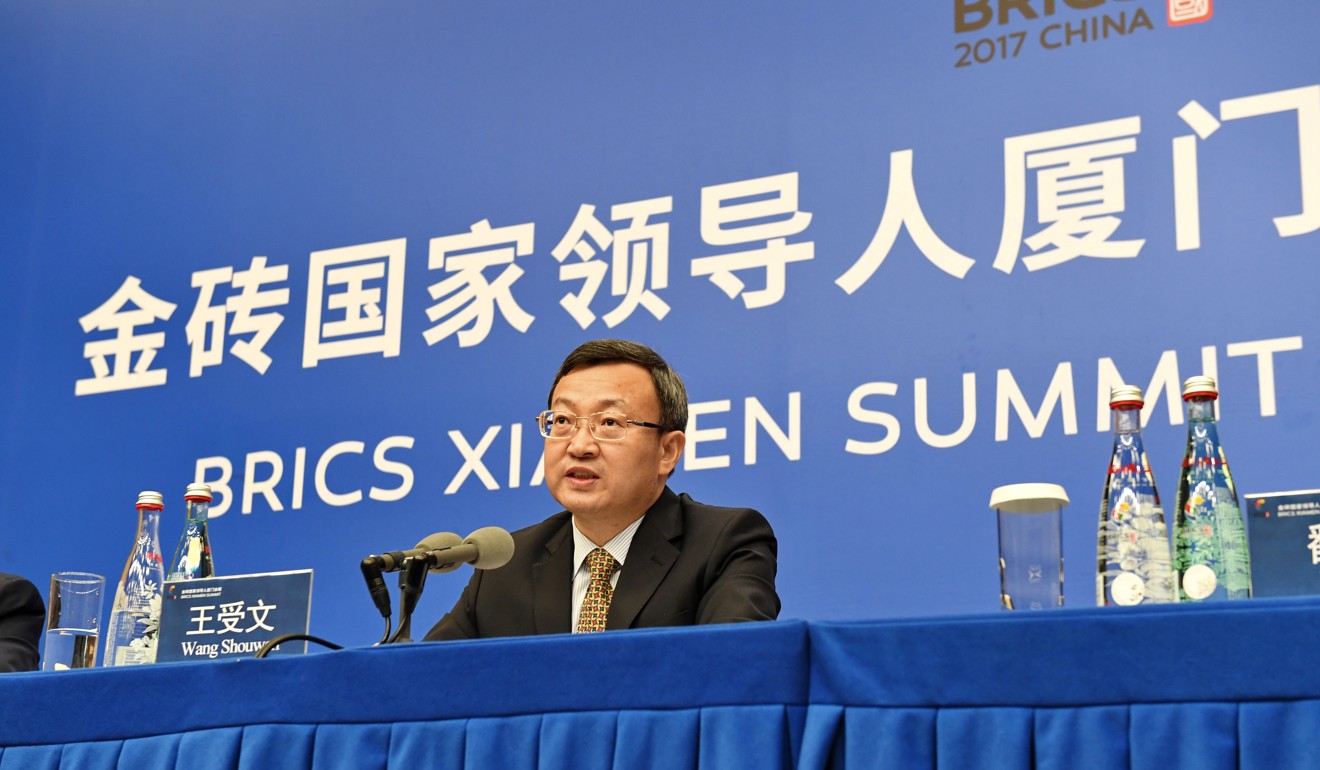
Directly under Yang Jiechi in the party’s reporting line is Wang Yi, 64, the newly appointed state councillor and foreign minister since 2013. Known for his staunch defence of China’s positions in world affairs, Wang has said it is a “strategic misjudgment” for the US to brand China as a rival.
Another crucial figure on the diplomatic front is Cui Tiankai, China’s ambassador to Washington, who has extensive networks within US political and business circles. Turning 66 in October, Cui is due to retire, leaving big shoes to fill. One leading candidate to succeed him is Zheng Zeguang, 54, the deputy foreign minister in charge of US affairs, who also accompanied Liu on the US trip.
China says it ‘will play a role’ in Korean peace as Wang Yi visits Pyongyang
On security and defence – another major source of friction with the US – the go-to person for high-level military exchanges is Major General Shao Yuanming, 61, deputy chief of the Joint Staff Department of the powerful Central Military Commission. He met General Joseph Dunford, chairman of the US Joint Chiefs of Staff, at the Pentagon in November for the first meeting of the China-US Joint Staff Dialogue Mechanism.
The instalment of trusted allies on the new US policy team was partly enabled by Xi’s concentration of power. Through a ferocious anticorruption crusade spearheaded by the current vice-president, Xi was able to brush aside rivals and quash dissent within the party, and place key positions in trusted hands.
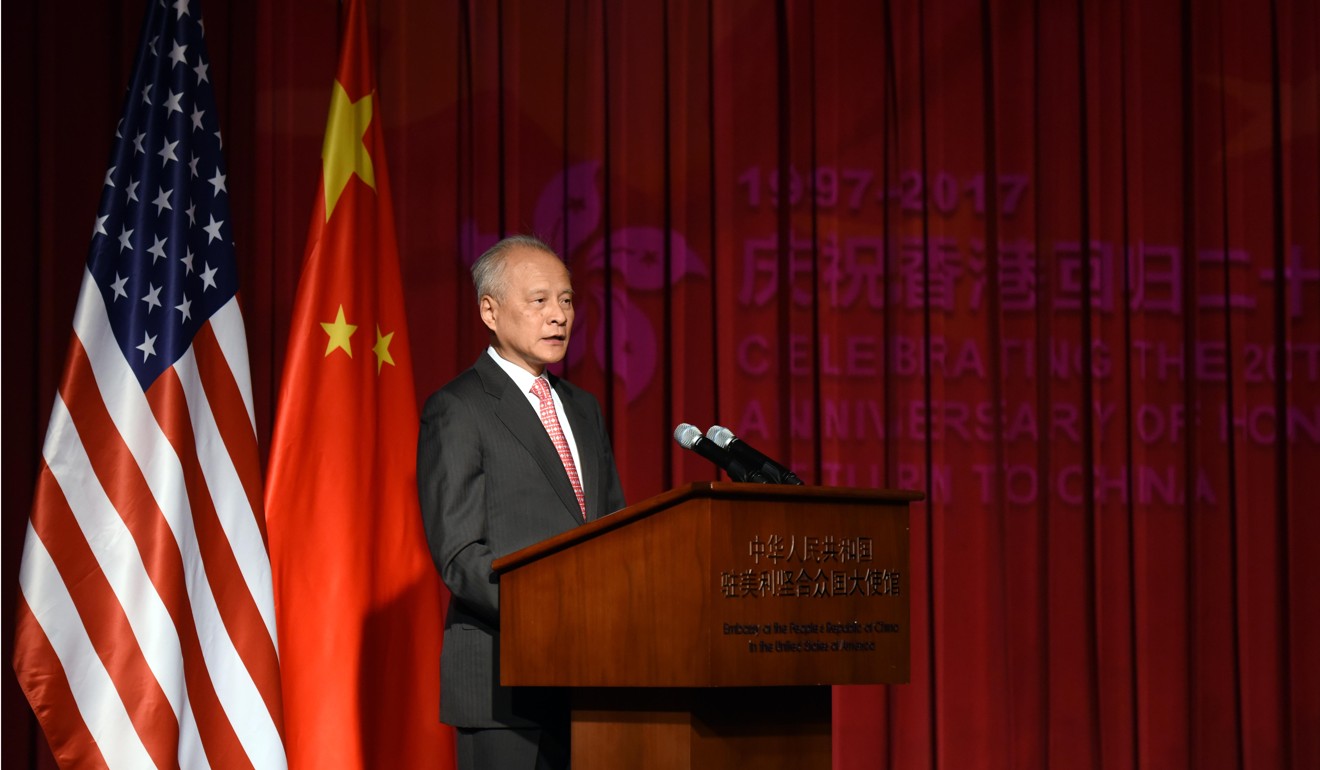
This is in contrast to the era under his two predecessors, Jiang Zemin and Hu Jintao, which was marked by intense internal competition within the ruling party. Cheng Li of the Brookings Institution once famously described it as a “post-Deng China run by a team of rivals”, referring to Deng Xiaoping.
“In a sense, all these people on the team now are Xi’s allies and Xi’s players, so there is a remarkable degree of consistency and stability with which they’re able to negotiate with the Americans,” said Hoo of Nanyang Technological University.
Having close allies like Wang and Liu on the team also allowed US officials and business leaders to circumvent the often opaque Chinese bureaucracy to find the people who have Xi’s ear – and thus a real say in China’s US policies, Hoo noted.
“You know who you’re going to be dealing with on the Chinese side,” Hoo said. “If you’re a foreign counterpart, you will feel confident negotiating with Wang or Liu because you know that this guy effectively has Xi’s trust and can represent his ideas and his words.”


